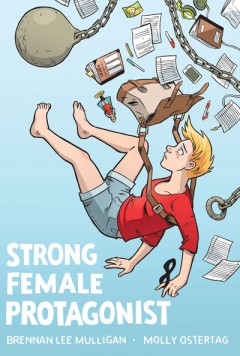Review: Strong Female Protagonist: Book One (Top Shelf Comics)
 Collecting together the hit webcomic, Top Shelf Comics’ Strong Female Protagonist: Book One is a labour of love from creative team Brennan Lee Mulligan and Molly Ostertag. This book would not have been possible without Kickstarter funding, so does raising $60,974 a good book make?
Collecting together the hit webcomic, Top Shelf Comics’ Strong Female Protagonist: Book One is a labour of love from creative team Brennan Lee Mulligan and Molly Ostertag. This book would not have been possible without Kickstarter funding, so does raising $60,974 a good book make?
 Publisher: Top Shelf
Publisher: Top Shelf
Writer: Brennan Lee Milligan
Artist: Molly Ostertag
Price: £5.49 from ComiXology
Strong Female Protagonist: Book One revolves around 20-year-old Alison Green, A.K.A Mega Girl who used her super strength and invulnerability as a teenager to fight crime with her fellow heroes, ‘The Guardians’. The story was originally published as a bi-weekly webcomic, so the overall structure of the story is a little wobbly at first. You get dropped into the middle of a birthday party with no real explanation as to who anybody in the scene is until much later, but this dropping-in of an everyday real-life situation coaxes you in gently so the real hard-hitting examination of morality later on in the book is not so jarring.
As an indie publication – the book was funded through Kickstarter – the creators both have full reign over how the work is presented and what themes and issues they present to their reader, unlike more mainstream comics. Artist Molly Ostertag draws real-life people of all shapes and races, a true breath of fresh air from gorgeous beef cakes and anorexic-skinny women lacking organs. The simplicity of the artwork doesn’t detract from the complexity of the ethics and morality being examined throughout the book, especially in chapter 3. Examining these sorts of issues doesn’t have to be overly complicated and this creative team have found the perfect balance in how to raise these issues in their readers’ minds.
The writing throughout is a fluid, intelligent script that is down-to-earth in examining the wider issues of superheroes, villains and ethics. It doesn’t try to be pretentious and instead uses a simple everyday language so that the reader goes away understanding everybody’s opinion, while moulding each character into a realistic, believable person.
So in the world of post-modern superheroes, does SFP bring anything new to the table? Well, yes. The book opens with no mention of Alison’s alias or powers and the information is drip-fed throughout rather than being info-dumped across a double spread. It’s this Alison Green first, Mega Girl second approach that makes SFP such a joy to read. She’s trying to get through her college course without preferential treatment (her college reading list is also included so you can read along with her!), trying to be her own person and move under her own agency rather than letting other people make decisions for her.
It’s also this subtle nod towards feminism throughout the book that really sets the bar for other post-modern superhero publications. It proves that it is possible to examine feminist issues in a superhero book without making it scary or belittling it. This may be down to the fact that SFP is an indie publication rather than a mainstream, slick, shiny publication, and the goal is to not make as much money as possible. However, this plays in SFP’s favour as you feel throughout that the creative team are not set apart from real life and real life issues.
The other detail that SFP handles that a lot of superhero books don’t is a living, breathing family. Alison Green is not an orphan or estranged from her parents. Instead she has a supportive, weird family that do what everyday families do. Being allowed into Alison’s childhood and seeing how her parents raised her gives us deeper glimpses into how she became the person she is in the present, and also creates a more realistic character – as realistic as an invulnerable comic character can get – in comparison to broody orphans. The effort put into creating a whole family unit is something that the superhero genre sometimes lacks. While beating up villains and bringing them to justice is good fun, there’s more to superheroes than crime fighting, spandex and childhood trauma.
Other superhero comics could learn a lot from SFP on how to create well-rounded, believable characters that don’t need to squeeze into size 0 spandex costumes that are more boob-window than not. Do yourself a favour and pick up this book.


